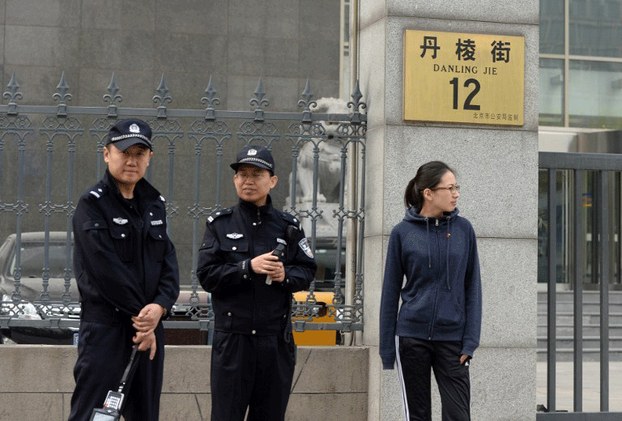




Authorities in the Chinese capital on Thursday resumed the trial of another anti-corruption activist on public order charges, the fourth in less than a week, amid rising concerns over a missing defense attorney.
Zhao Changqing, a veteran campaigner for democracy and the rule of law, was accused of "gathering a crowd to disrupt public order," a charge that carries a maximum jail term of five years, but he wasn't allowed to speak during the three-hour hearing at Haidian District People's Court in Beijing.
"I was in the courtroom observing, but he had no opportunity to speak," the 45-year-old Zhao's wife Liu Xiaodong said in an interview after the trial ended.
"The court went through all the procedures from start to finish," she said.
Zhao's lawyer Zhang Peihong said the activist had pleaded "not guilty" to the charges, arguing that he hadn't attended street protests at which activists unfurled banners calling on officials of the ruling Chinese Communist Party to reveal their assets.
But he said the case was subject to strong political interference.
"It's very hard to be optimistic [about the outcome]," Zhang said. "We did everything we could to find out what their bottom line was, but it seemed that this case is being directed from the highest levels of government."
"So we decided just to make our arguments, regardless of the results," he said.
'Ridiculous charges'
Zhang said the charges against his client were "ridiculous."
"These are charges that will elicit ridicule around the whole world," he said. "If someone can be arrested for doing so little, then nothing can be ruled out."
Zhao is the latest in a string of activists to stand trial in relation to growing public demands for a more transparent government in China, amid a series of media reports detailing complex networks of offshore assets linked to top party leaders in recent months.
More than 10 other members of the New Citizens' Movement have been tried, with deferred trials resuming this week for Ding Jiaxi and Li Wei, whose lawyers have continually complained that the court flouted accepted legal procedure. The New Citizens' Movement is a loose network of activists campaigning against corruption, among other issues.
The trial of another activist, Zhang Baocheng, was resumed behind closed doors on similar charges in a one-day hearing on Wednesday, although few details of the procedure have emerged.
Zhang Baocheng, Ding, and Li had all previously dismissed their lawyers in protest at the court's alleged failure to follow due process on Jan. 27, while Zhao had done the same at his initial trial on Jan. 23.
The movement's co-founder, Xu Zhiyong, was sentenced on Jan. 26 to four years' imprisonment on the same charges as Zhao.
Xu's lawyers also said his trial was subject to political interference and took the case to appeal, which will be heard by a Beijing court on Friday.
The U.S. and the European Union condemned Xu's sentencing, but rights groups say the appeal court will likely uphold the original verdict and sentence.
Elite's 'inner workings'
Since taking power in November 2012, President Xi Jinping has vowed to take down high-ranking "tigers" and lower-level "flies" in his anti-corruption campaign.
But the government is apparently also keen to avoid revealing embarrassing information about the inner workings of China's power elite, fearing a threat to its rule.
Zhao had previously served more than eight years in jail for his activism as a leader of the1989 student-led pro-democracy protests on Tiananmen Square.
Meanwhile, New Citizens' Movement attorneys are growing increasingly concerned about lawyer Wang Jinping, who has been incommunicado since driving to Beijing from Guangzhou to assist with the defense at this week's trials, Zhang said.
"It's not inconceivable that they have detained Wang Jinping," he said. "If they have detained him, I think we should pursue criminal charges against whoever is responsible."
China's embattled legal profession has come under increasing pressure from the authorities in recent years, especially when handling politically sensitive cases.
Abused in detention
Three lawyers detained on March 21 in the northeastern province of Heilongjiang for representing a client in a "black jail," or unofficial detention center, were released this week, with two of them detailing extreme physical abuse while in detention, while a fourth lawyer detained at the same time and released last week also described torture while in custody.
On April 6, Tang Jitian, Wang Cheng, and Jiang Tianyong were released after serving 15-day administrative detentions on charges of "using cult activities to disturb social order" after they applied to visit the "black jail" where their client is being held.
Tang and Wang Cheng described being handcuffed, hooded, strung up with rope by their hands, and beaten while held in the Daxing public security sub-bureau in Heilongjiang's Jiansanjiang city, an overseas-based rights group said.
Tang, who was tortured after refusing to sign a police report, had a tooth knocked out and also has several fractured ribs, the Chinese Human Rights Defenders (CHRD) group said in an e-mailed statement.
Wang Cheng was hit in the chest, legs, and back with a police baton, while Jiang, who has been charged with "possession of state secrets"
and released on bail to await trial, suffered bruises and soft tissue injuries, it said.
Reported by Wen Yuqing for RFA's Cantonese Service, and by Xin Yu for the Mandarin Service. Translated and written in English by Luisetta Mudie.